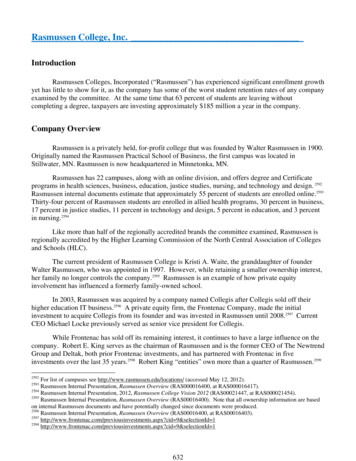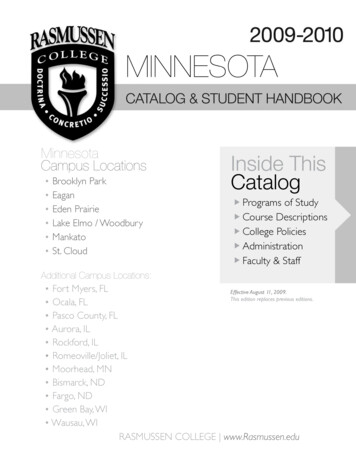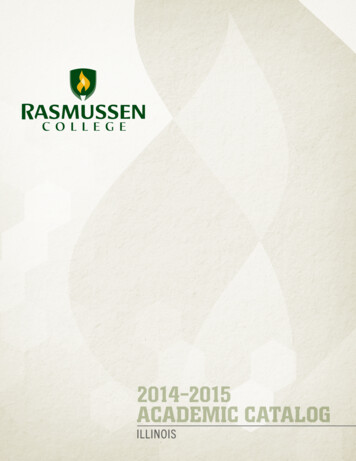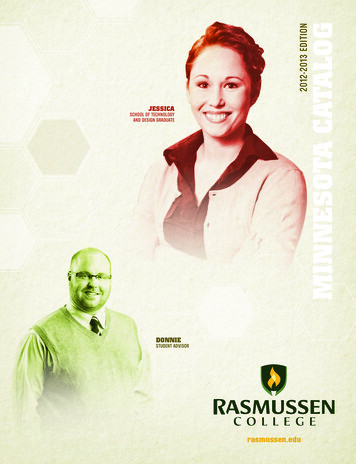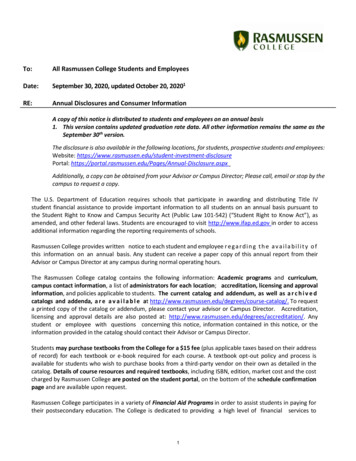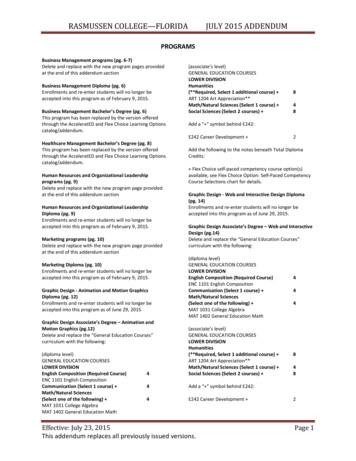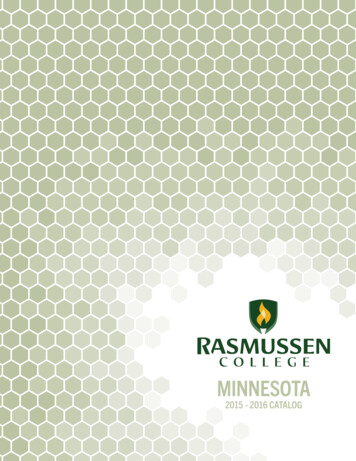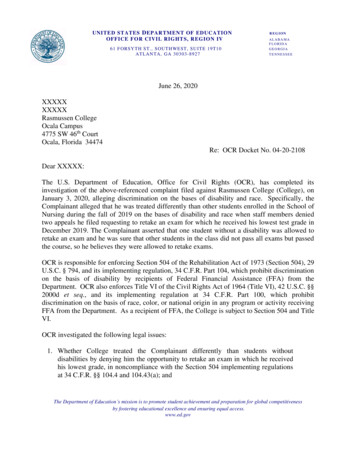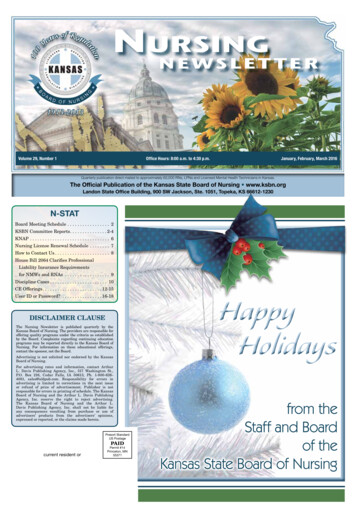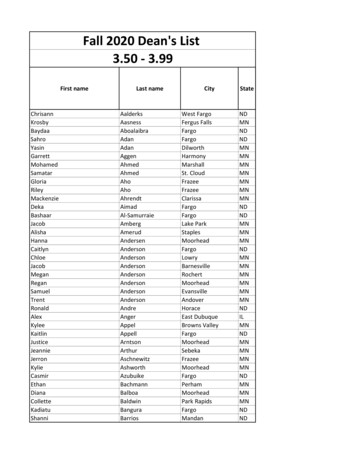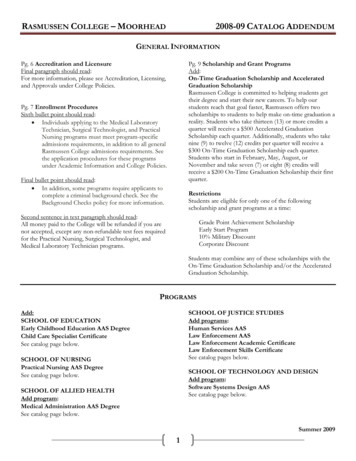
Transcription
RASMUSSEN COLLEGE – MOORHEAD2008-09 CATALOG ADDENDUMGENERAL INFORMATIONPg. 6 Accreditation and LicensureFinal paragraph should read:For more information, please see Accreditation, Licensing,and Approvals under College Policies.Pg. 9 Scholarship and Grant ProgramsAdd:On-Time Graduation Scholarship and AcceleratedGraduation ScholarshipRasmussen College is committed to helping students gettheir degree and start their new careers. To help ourstudents reach that goal faster, Rasmussen offers twoscholarships to students to help make on-time graduation areality. Students who take thirteen (13) or more credits aquarter will receive a 500 Accelerated GraduationScholarship each quarter. Additionally, students who takenine (9) to twelve (12) credits per quarter will receive a 300 On-Time Graduation Scholarship each quarter.Students who start in February, May, August, orNovember and take seven (7) or eight (8) credits willreceive a 200 On-Time Graduation Scholarship their firstquarter.Pg. 7 Enrollment ProceduresSixth bullet point should read: Individuals applying to the Medical LaboratoryTechnician, Surgical Technologist, and PracticalNursing programs must meet program-specificadmissions requirements, in addition to all generalRasmussen College admissions requirements. Seethe application procedures for these programsunder Academic Information and College Policies.Final bullet point should read: In addition, some programs require applicants tocomplete a criminal background check. See theBackground Checks policy for more information.RestrictionsStudents are eligible for only one of the followingscholarship and grant programs at a time:Second sentence in text paragraph should read:All money paid to the College will be refunded if you arenot accepted, except any non-refundable test fees requiredfor the Practical Nursing, Surgical Technologist, andMedical Laboratory Technician programs.Grade Point Achievement ScholarshipEarly Start Program10% Military DiscountCorporate DiscountStudents may combine any of these scholarships with theOn-Time Graduation Scholarship and/or the AcceleratedGraduation Scholarship.PROGRAMSAdd:SCHOOL OF EDUCATIONEarly Childhood Education AAS DegreeChild Care Specialist CertificateSee catalog page below.SCHOOL OF JUSTICE STUDIESAdd programs:Human Services AASLaw Enforcement AASLaw Enforcement Academic CertificateLaw Enforcement Skills CertificateSee catalog pages below.SCHOOL OF NURSINGPractical Nursing AAS DegreeSee catalog page below.SCHOOL OF TECHNOLOGY AND DESIGNAdd program:Software Systems Design AASSee catalog page below.SCHOOL OF ALLIED HEALTHAdd program:Medical Administration AAS DegreeSee catalog page below.Summer 20091
RASMUSSEN COLLEGE – MOORHEAD2008-09 CATALOG ADDENDUMPg. 16 Business Management BS DegreeProgram objective should read:Graduates of this program know concepts in management,human resources, marketing, business law and ethics, andcustomer service. They understand accounting, andadvanced management theories and techniques in a varietyof fields. They can apply, analyze, synthesize, and evaluatefacts and theories; locate, evaluate, and integrateappropriate primary and secondary sources; integrate theirideas with the ideas of others to create new knowledge;recognize and address complex ethical situations;communicate effectively in a variety of scenarios; andoperate effectively within a continually changingenvironment. They value critical thinking, communication,diversity, leadership, integrity, and lifelong learning.Pg. 10 Exercise Science AAS DegreeMA125 Pharmacology for the Allied Health Professionalshould read:NumberTitleCreditsMA135Pharmacology for theAllied Health Professional4Pg. 11 Health Information Technician AAS DegreeStatement on CAHIIM accreditation should read:The Health Information Technician associate’s degreeoffered at the Brooklyn Park, Eagan, Eden Prairie, LakeElmo, Mankato, Rockford, and St. Cloud campuses isaccredited by the Commission on Accreditation for HealthInformatics and Information Management Education(CAHIIM).B480 Critical Issues in Business should readNum. CourseB498 Management CapstoneThe Health Information Technician associate’s degreeoffered at the Green Bay campus is in Candidacy Statusfor accreditation by the Commission on HealthInformatics and Information Management Education(CAHIIM).1212Total Degree Credits should read:Total Degree Credits111*16Unrestricted elective credits should read:Lower Division General Education – Social Sciencesshould read:Social Sciences (1 required***; select 1 course)Num. CourseCreditsG122 World Geography4G123 Principles of Economics***4G137 Introduction to Psychology4G142 Introduction to Sociology4G243 Contemporary U.S. Government4Pg. 12 Medical Laboratory Technician AAS DegreeStandard Length of Program should read: 8 Quarters Full-TimeML291 and ML292 should read:ML291 Clinical Practicum IML292 Clinical Practicum IICredits3Triple-asterisked (***) statement should read:***G123 Principles of Economics and G233 College Algebra arerequired. Students must complete one additional course from both theMath/Natural Sciences and Social Sciences categories.Pg. 15 Accounting AAS DegreeObjective should read:Graduates of this degree program learn to manageaccounts receivable and accounts payable. They learn toprepare tax returns and financial statements, and usecomputer applications proficiently. They know financialand managerial accounting concepts as related to thebusiness environment. They value critical-thinking andcommunication skills and the ability to relate accountingconcepts to the world around them.Pg. 16 Business Management AAS DegreeObjective should read:Graduates of this degree program know major concepts inaccounting, business, business ethics, business law, andfinance. They can demonstrate management skillsincluding planning and decision making, organizing,controlling, and leading employees. They can interpretbasic financial data and perform basic accounting skills.They can use computer applications for the businessenvironment. They value critical thinking, communication,diversity, and lifelong learning.Summer 20092
RASMUSSEN COLLEGE – MOORHEADMarketing and Sales Specialization should read:B119Customer ServiceB140Sales TechniquesB218E-CommerceB224Marketing EthicsB232Principles of MarketingB263Principles of AdvertisingR200Principles of RetailingTotal Degree CreditsAdd Specializations:Child Development SpecializationCC151A Foundations of Child DevelopmentCC152 Early Childhood EducationCurriculum and InstructionCC153A Health, Safety, and NutritionCC258A Infant and Toddler DevelopmentCC259 Dynamics of the FamilyCC260A The Exceptional ChildCC261A Emerging Literacy ThroughChildren’s LiteratureTotal Degree CreditsEntrepreneurship SpecializationB146Introduction to EntrepreneurshipB240Entrepreneurial Product andService PlanningB243Entrepreneurial MarketingB244Entrepreneurial Finance:Capitalization for the EntrepreneurB247Entrepreneurial InternshipB293Business EthicsTotal Degree Credits2008-09 CATALOG ADDENDUMsuccessfully complete an officially recognized first-aidcourse in First Responder, Emergency Medical Technician,or Emergency Response, and to complete skills training.Students must provide the Rasmussen College LawEnforcement POST Coordinator with a copy of theirrequired first-aid certification (e.g., a photocopy of theirfirst-responder card) for inclusion in each student’s POSTfile maintained at Rasmussen College. Some skills trainingproviders may require additional academic coursework.444444495*Pg. 20 Professional Peace Officer EducationCertificateRemove this program from the catalog. Beginning inSummer 2009, students who wish to obtain licensing asprofessional peace officers must enroll in the LawEnforcement AAS Degree, Law Enforcement AcademicCertificate, and/or the Law Enforcement Skills Certificate.444444Pg. 22 Information Systems Management AAS DegreeCareer Opportunities should read: Computer Support Specialist Network System Administrator Network Security Specialist Computer Application Support Specialist Web Developer Database Administrator495*44444491*Database Administration Specialization should read:This degree program is also offered online.Pg. 23 Multimedia Technologies AAS DegreeProgram Objective should read:Graduates of this program know basic theories of visualand interactive media design, project management, andportfolio development. They understand business and canapply this understanding to multimedia projects. They cancreate multimedia projects involving traditional arttechniques, video, and audio assets. Graduates valuecritical thinking, communication, and lifelong learning.Pg. 19 Criminal Justice AASRemove triple-asterisked (***) statement on requirementof G141 for the PPOE track.Law Enforcement Specialization should read:Law Enforcement Specialization***Statement on PPOE track should read:***Students seeking licensing as professional peace officersmust take the Law Enforcement specialization. In order tosit for the licensing exam, students are also required toSummer 20093
RASMUSSEN COLLEGE – MOORHEAD2008-09 CATALOG ADDENDUMCOURSE DESCRIPTIONSPg. 24 Credit DefinitionText should read:Credit Hour - The unit by which Rasmussen Collegemeasures its coursework. The number of credit hoursassigned to a course usually reflects the combination ofclass, laboratory, and/or internship hours required in thecourse. Rasmussen College follows the quarter system, andawards one credit for each 10 clock hours of lecture, 20clock hours of laboratory, or 30 clock hours of internship,externship, practicum contained in a quarter, or theequivalent in directed study.BU307 InsuranceAdd:Prerequisite: Introduction to BusinessClock Hour - Equal to 50 minutes ofinstruction.BU402 Strategic ManagementShould read:This course is designed to integrate prior business coursesthrough study, discussion, and creation of strategicmanagement plans. Students will evaluate the keyfunctions of organizations and integration of thesefunctions to understand the best practices used to achievecompetitive advantages. Topics will include strategicformulation, implementation, and evaluation.BU322 Money and BankingAdd:Prerequisite: Principles of Economics or equivalent.BU340 Professional SellingAdd:Prerequisite: Principles of MarketingPg. 24 Course PrefixesAdd the following:CCChild CareHSHuman ServicesLELaw EnforcementSDSoftware Systems DesignBU480 Small Business ManagementAdd:Prerequisite: Principles of ManagementRemove:B096 English for Second Language LearnersR204 EntrepreneurshipG435 Literature of American MinoritiesCourse description should read:This course introduces students to a variety of texts byAmerican minority authors from the mid-19th century tothe present. The central focus of this course will be onliterary responses to social marginalization based onrace/ethnicity, gender, national origin, sexuality/sexualorientation, ability, and other factors. Students will studythe effects of exclusionary and oppressive practices, bothhistorical and present day, on writers’ perceptions andliterary representations of their times, contexts, andidentity. Students will also be introduced to samples of themost common critical-theoretical approaches to theprimary texts they will study in this class.B480 Critical Issues in BusinessShould read:B498 Management Capstone*30 hours, 3 creditsIn this course, students analyze, synthesize, evaluate, andcreate new knowledge by reviewing, contemplating, andapplying theoretical concepts studied throughout theirdegree in creating a solution for an actual managementneed. This course is designed to be taken at the end of theprogram.Prerequisite: Business BS student in last or second-to-lastquarter.J115 Introduction to CorrectionsPrerequisite should read:Prerequisite: Introduction to Criminal JusticeBU301 Public RelationsAdd:Prerequisite: Principles of MarketingSummer 20094
RASMUSSEN COLLEGE – MOORHEAD2008-09 CATALOG ADDENDUMN127 Microsoft Windows WorkstationsCourse description should read:This course provides students with the knowledge andskills necessary to install and configure a WindowsWorkstation. The course gives the student the ability toprovide technical support to a Windows Workstation.This course uses a combination of lectures,demonstrations, discussions, online assignments, andhands-on labs to reinforce the course materials. Further,the course helps prepare students to take the MicrosoftCertified Technology Specialist Exam.M209 Medical Insurance and BillingCourse description should read:In this course students will receive an introduction tocommon 3rd party payers, insurance terminology, andmedical billing. They will learn skills including claim formspreparation and processing, and electronic claimsubmission, and will review introductory medical coding.They will also examine plan options, payer requirements,state and federal regulations, and abstracting of sourcedocuments.Prerequisite: Medical TerminologyN234 Microsoft Exchange ServerCourse description should read:In this course students will learn a wide range ofinformation about Exchange Server, from installation,configuration, administration, troubleshooting, andmaintenance. It introduces a variety of concepts, such asclient configuration. In addition to explaining concepts,the course uses a multitude of real-world examples ofnetworking and messaging issues. This course uses acombination of reading, lecture, and lab work to reinforcestudent learning. Further, this course helps preparestudents to take Microsoft’s MCSE Exam #70-236.M252 Health Information PracticumCourse description should read:A simulated practical experience exploring a virtualhospital and clinic and using software and practicalsimulation assignments to experience real-world situationswithin HIM departments and other hospital departments.The practicum allows students to gain experience as ahealth information technician in a simulated healthcarework setting, and is essential to training and certification.Prerequisite: Medical Law and Ethics, HealthcareInformation Technologies, Quality Analysis andManagementST105 Introduction to Surgical TechnologyCourse description should read:This course will introduce the student to the field ofsurgical technology and prepare them to become a part ofthe operating room team. Areas explored in this course aremedical terminology for the operating room, introductionto microbiology, medical and surgical asepsis, operatingroom design, and surgical equipment, patient care,procedures, and instrumentation.ML100 Introduction to Clinical Laboratory SciencePrerequisite should read:Prerequisite: Program admission.ML150 Clinical Chemistry IPrerequisite should read:Prerequisites: Introduction to Clinical Laboratory Science,Human Anatomy and Physiology ICo-requisite: College AlgebraST112 Surgical Procedures ICourse description should read:This course will orient the student to surgical technologyand prepare them for scrub and circulator duties as well asSurgical Practicum I. Topics include standards of conduct,special populations, safety standards, biomedical medicine,asepsis and sterile technique, anesthesia, andinstrumentation.ML291 Clinical Practicum IHours and credits should read:360 hours, 12 creditsML292 Clinical Practicum IIHours and credits should read:360 hours, 12 creditsSummer 20095
RASMUSSEN COLLEGE – MOORHEAD2008-09 CATALOG ADDENDUMADD:ST203 Surgical Procedures IICourse description should read:This course will expand on the duties and responsibilitiesas the role of scrub or STSR and circulator in the field ofsurgical technology. Areas explored and applied in thiscourse include wound healing, surgical case management,instrumentation, diagnostic procedures, and anintroduction to general surgery and the scrub role. Thiscourse is a preparatory class for Surgical Practicum II.B146 Introduction to Entrepreneurship40 hours, 4 creditsStudents will learn the basic concepts of entrepreneurship.Through real-life case studies, students will examineentrepreneurship as a means to executing against marketopportunities. They will explore entrepreneurship forproducts and services across industries, sectors, markets,and regions. Students will also review the lifecycle ofentrepreneurial business development.ST207 Surgical Procedures IIICourse description should read:This course will expand on the duties and responsibilitiesin the role of scrub in the field of surgical technology.Students will continue and apply knowledge gained inSurgical Procedures I and II as well as explore specialtysurgery areas. This course is a preparatory class for SurgicalPracticum I and II.Prerequisite: Introduction to BusinessB240 Entrepreneurial Product and Service Planning40 hours, 4 creditsStudents will explore the ways in which products andservices are developed. They will review the variousmethods used to identify market opportunities, to engagein market sizing, and to develop an understanding of thecompetition. Students will develop a basic product orservice plan, which will include a detailed description ofhow the product or service will be designed, sourced ormanufactured, and delivered to the client. Students willalso examine about the lifecycle of products and servicesonce they are launched.ST215 Surgical Tech Practicum ICourse description should read:This course is designed to provide the student with aclinical experience that includes a solid introduction to theoperating room, and to scrub and circulating routines.This course functions to expand and apply knowledgegained in the Surgical Procedures courses. One of theassumptions of this curriculum is that the student who haspassed the Clinical Readiness portion of the program willbe ready to apply knowledge by scrubbing and circulatingin a supervised setting beginning Week 1 of this course.Prerequisite: Introduction to EntrepreneurshipB243 Entrepreneurial Marketing40 hours, 4 creditsStudents will examine all aspects of entrepreneurialST220 Surgical Tech Practicum IICourse description should read:This course is designed to provide the student with aclinical experience that includes a solid introduction to theoperating room, and to scrub and circulating routines.This course functions to expand and apply knowledgegained in the Surgical Procedures courses and the SurgicalTech Practicum I clinical experience. One of theassumptions of this curriculum is that the student who haspassed Surgical Practicum I will continue to applyknowledge by scrubbing and circulating in a supervisedsetting beginning Week 1 of this course.marketing. Using marketing case studies, students willexplore several entrepreneurial marketing tactics andwill create a marketing strategy for their chosenproduct or service. From this strategy, students willcreate a complete market plan. They will also presenttheir ideas to the classPrerequisite: Introduction to EntrepreneurshipSummer 20096
RASMUSSEN COLLEGE – MOORHEAD2008-09 CATALOG ADDENDUMB244 Entrepreneurial Finance: Capitalization forthe Entrepreneur40 hours, 4 creditsStudents will examine the ways in which entrepreneurialventures are financed. They will explore how to raise bothstart-up and operating capital. Students will participate ina simulation designed to teach them the value of financialmanagement and the practical use of tools such as profitand loss statements, balance sheets, income and cash flowstatements.CC152 Early Childhood Education Curriculum andInstruction40 hours, 4 creditsThis course promotes the development of young childrenin the academic, social, and emotional domains. Itexamines developmentally appropriate methods for writingand assessing behavioral objectives, lesson plans, andactivity goals. Various curriculum models will be reviewed.Strategies to enhance parent and family involvement willbe emphasized.Prerequisite: Principles of FinancePrerequisite: noneB247 Entrepreneurial Internship120 hours, 4 creditsStudents will complete an unpaid internship with aCC153A Health, Safety, and Nutrition40 hours, 4 creditsThis course examines the role of early childhoodprofessionals working in the field via the policies andprocedures governed by the state. Students will learnguidelines for establishing safe environments. They willalso learn strategies for implementing health policies,controlling disease, establishing proper nutrition, andresponding to children’s special health concerns. Studentsare required to carry out a 2-hour observation in the fieldof education.local entrepreneur or business owner. The Collegefacilitates the process of matching students withentrepreneurs. The internship will integrate priorcoursework into a comprehensive understanding ofentrepreneurship, providing students with hands-onlearning opportunities and work experience. Duringthe internship, the student will shadow theentrepreneur and write a series of short, reflectivepapers based on their experience.Prerequisite: nonePrerequisite: Entrepreneurship student in last or secondto-last quarterCC154A Observing and Promoting Development inthe Early Childhood Classroom240 hours, 8 creditsUnder externship supervision, the student will observe andimplement developmentally appropriate practicetechniques while interacting with children and family.CC151A Foundations of Child Development40 hours, 4 creditsThis course will explore characteristics of children atdifferent ages, children’s developmental needs, and thefoundation of early-childhood education. Students willlearn the fundamentals of developmentally appropriatepractice as it relates to child development, individualneeds, building self-esteem in children, and usinginterpersonal skills and communication within theclassroom and center. Students will study the function ofthe family, and the cultural, social, class, and ethnicvariations in the family as a social system.Prerequisite: noneCC155 Creating a Learning Environment300 hours, 10 creditsContinuation of Observing and Promoting Developmentin the Early Childhood Classroom. The focus is ondevelopmentally appropriate practices and leadership.Prerequisite: Observing and Promoting Development inthe Early Childhood ClassroomPrerequisite: noneSummer 20097
RASMUSSEN COLLEGE – MOORHEAD2008-09 CATALOG ADDENDUMCC156 Implementing Curriculum in the EarlyChildhood Classroom300 hours, 10 creditsThis course is a continuation of Observing and PromotingDevelopment in the Early Childhood Classroom. Thefocus is on developmentally appropriate practices andleadership.CC261A Emerging Literacy through Children’sLiterature40 hours, 4 creditsThis course covers the history, selection, and integration ofliterature and language in the early-childhood curriculum.Topics include developmentally appropriate children’sliterature and the use of books and other media to enhancelanguage and literacy in the early childhood setting.Strategies for enhancing emerging literacy throughtechniques such as selecting appropriate books forstorytelling, reading aloud, puppetry, and flannel-board usewill also be emphasized.Prerequisite: Creating a Learning EnvironmentCC258A Infant and Toddler Development40 hours, 4 creditsThis course will provide the foundation for responsive,relationship-based curriculum for infants and toddlers ingroup care. This course will introduce the philosophy andtheory behind primary care, continuity of care, andrespectful care as it relates to brain and attachmentresearch. Explores ways of creating environments forinfant/toddler group care which foster optimumsocial/emotional, physical, and cognitive development.Prerequisite: noneHS100 Introduction to Human Services40 hours, 4 creditsIntroduction to Human Services exposes the student tothe many facets of human services work. Topics to beexplored include programs, policies, history, politics, andhow current economics shape programs. Human serviceintervention strategies utilized in daily practice areexamined along with stresses faced in the workplace.Comparisons of human services systems from a variety ofcountries will also be examined.Prerequisite: noneCC259 Dynamics of the Family40 hours, 4 creditsThis course will focus on the dynamics of the family andthe family’s influence on the growth and development ofchildren. The history of family systems, child rearing, andparenting styles will be discussed. The course will exploreissues that families of today face.Prerequisite: noneHS110 Cultural Diversity in Human Services40 hours, 4 creditsThis course will examine diversity in many communitiesand the cross-cultural service delivery available in thosecommunities. Specific client populations will be explored,with an understanding of what cultural, physical, andmental diversity is and why it is important. Specialattention will be paid to working with people of bothmental and physical disabilities. Those disabilities include,but are not limited to, mental retardation, autism, andAsperger’s Syndrome.Prerequisite: noneCC260A The Exceptional Child40 hours, 4 creditsThis course is designed to explore the benefits of inclusionin the early-childhood setting. Students will develop anunderstanding of exceptional development. Students willidentify the parties relevant to exceptional developmentand their roles as resources in support of the child andtheir families.Prerequisite: Introduction to Human ServicesPrerequisite: noneSummer 20098
RASMUSSEN COLLEGE – MOORHEAD2008-09 CATALOG ADDENDUMHS115 Introductory Strategies to Crisis Intervention40 hours, 4 creditsThis course sets the foundation for students to develop themorals, ethics, and attitude necessary to strategically helpthose in crisis situations. The values and ethics intrinsic tothe human services profession will be explored, as well asdeveloping interpersonal communication skills. Studentswill explore how human services professionals function aschange agents and must therefore attain and develop acore of intervention knowledge, theory, and skills toeffectively deal with people in crisis. The ability to creategenuine and empathetic relationships with others is centralto those entering the human services field. Interventionstrategies are also explored.HS280 Abnormal Psychology40 hours, 4 creditsIn this course students will understand the applieddiscipline of abnormal psychology. In order to understandand change abnormal patterns of functioning humans intheir communities, thoughts and behavior will beexamined. Students will explore what is abnormal behaviorand what is not in current society and cultures. Numerousapplications will be examined, including a variety of mentalhealth disorders, individuals who have difficultyfunctioning effectively in everyday life, the impact offamily dysfunction on the individual, and the influence ofmental illness on criminal behavior. Variables that mayaffect a person’s ability to adapt and function in acommunity will be considered, such as one’s geneticmakeup, physical condition, learning, reasoning, andsocialization.Prerequisite: Introduction to Human ServicesHS250 Organization and Leadership in HumanServices40 hours, 4 creditsWorking and managing within a human servicesorganization takes high morals, standards, and ethics.Through this course, students will consider the complexityof moral and ethical dilemmas in navigating and managingin the human service industry. Students will learndecision-making techniques to include the necessarycomponents for an ethical reasoning process. In order tohave a strong foundation of practice, students will learn tohow to build a strong ethical organization through culture,climate, and structure.Prerequisite: Introduction to PsychologyHS290 Human Services Internship260 hours, 9 creditsField experience is a key learning experience in a humanservices delivery organization. It is a process of experientiallearning that integrates the knowledge, theory, skills, andprofessional behaviors that are concurrently being taughtwithin the classroom. It is an integral part of the totaleducational process.Prerequisite: Students must be in their last or second tolast quarter before graduation.Prerequisite: Case Management, Counseling ClientsJ222 Practical Psychology for Law EnforcementPrerequisite should read:Prerequisite: Introduction to Criminal JusticeHS260 Community Psychology40 hours, 4 creditsCommunity Psychology focuses on the four systems whichfunction in a community: the mental health system, theeducational system, the criminal justice system, and thesocial service system. As human service professionals,students will analyze problems in these communities andwill evaluate individuals functioning in these systems,offering both answers and proactive models of prevention.Community psychology works toward the empowermentof members within a community, while appreciatingdiversity and understanding human behavior. Socialchange will be examined as well as understanding thatsetting or environment is as important as the individual init.Prerequisite: Introduction to PsychologySummer 20099
RASMUSSEN COLLEGE – MOORHEAD2008-09 CATALOG ADDENDUMLE200 Traffic Enforcement40 hours, 3 creditsStudents will learn the skills for legal, effective, and safetraffic enforcement on city streets and majorthoroughfares. They will examine implications of trafficcodes and relevant court decisions through practicalapplication. They will explore criminal and druginterdiction strategies through effective trafficenforcement, and special considerations in impaired driverenforcement. They will learn to operate enforcement toolssuch as speed detection devices and alcohol sensoryequipment. Students will examine the writing andarticulation of enforcement decisions, and potential courtoutcomes of enforcement actions.LE221 Defensive Tactics I40 hours, 2 creditsStudents will learn fundamental fighting principles,including technical and psychological aspects of physicalcombat. They will use tactical positioning, commandpresence, verbalization skills, and interpretation of bodylanguage in confrontational situations. They wil
Rasmussen College is committed to helping students get their degree and start their new careers. To help our students reach that goal faster, Rasmussen offers two scholarships to students to help make on-time graduation a reality. Students who take thirteen (13) or more credits a quarter will receive a 500 Accelerated Graduation
